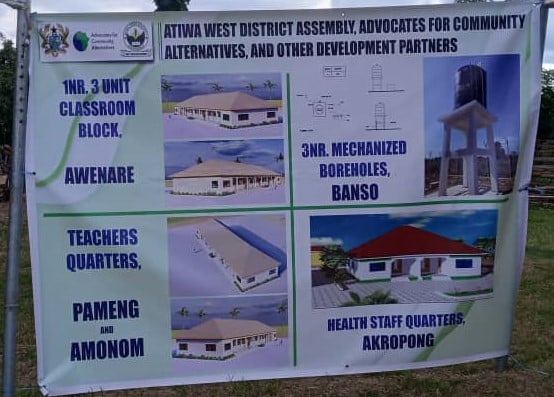Advocates for Community Alternatives (ACA), a non-profit organization, is collaborating with four District Assemblies in Ghana to implement the Facilitated Collective Action Process (FCAP), also known as “Oman yie die,” across 45 communities. These communities are located in the Abuakwa South, Fanteakwa South, and Atiwa West districts of the Eastern Region and the Nkoranza South Municipality in the Bono East Region. The partnership aims to make FCAP a central community development tool that aligns with the Medium-Term Development Plans set by these Assemblies. By adopting this approach, communities are encouraged to form a cohesive development vision that not only enhances their functional capabilities but also provides financial backing—each community receives a $9,000 microgrant to help realize their development projects. The local district assemblies are also contributing $1,000 in counterpart funding alongside their support and supervision.
The initiatives being advanced under this partnership encompass a wide range of community development projects such as the establishment of laboratories, mechanized boreholes, markets, classrooms, dormitories, and health facilities. Additionally, some of these communities are introducing livelihood enhancement initiatives that include centers for palm-oil production, pastry-making, corn-mill operations, and pig farming. These multifaceted projects align with the overarching objective of improving community livelihood and infrastructure. According to Douglas Puddy Amponsah, the Atiwa West District Chief Executive, this collaboration with ACA is vital as it brings tangible improvements to the community’s condition and encourages collective engagement to support project execution through communal labor. This further strengthens the capacity of communities to meet their medium-term development targets.
Long-term, ACA envisions FCAP as a preeminent development strategy for all district assemblies across Ghana. The organization’s commitment to mobilizing West African communities against various threats hinges on the principles of law and community-driven development. Nana Ama Nketia-Quaidoo, ACA’s Director of Community-Driven Development, highlighted the intent to scale the “Oman yie die” initiative as a means to demonstrate Community-Driven Development (CDD) as a sustainable, cost-effective approach for empowering local communities. By engaging with local government agencies, ACA aims to ensure that community members are poised to take charge of their developmental trajectories, where local voices and aspirations are duly considered in the broader framework of national progress.
The initial pilot of FCAP began last year, encompassing ten communities: Abompe, Saaman, Bososo, Kplandey, Nsutam, Dome, Dwenase, Heman in the Fanteakwa South District, and Asikam and Ahwenease in the Abuakwa South Municipality. This program was borne out of previous successful projects in various communities like Donkro Nkwanta, Nwoase, Salamkrom, and Kyeredeso in the Bono East Region, as well as Juaso, Sagyemase, and Nsuapemso. The positive outcomes from these pilot initiatives have laid the groundwork for the current expansion across additional districts.
The emphasis of the FCAP initiative on collective action is not just about implementing projects but reinvigorating a sense of shared purpose among community members. Engaging various stakeholders in the planning and execution stages ensures broader community participation, fortifying the essence of local governance. Community members are encouraged to rally together, leveraging their unique skills and resources to amplify the impact of external support. The expectation is that through communal involvement, the effectiveness of financial contributions from ACA and district assemblies can be maximized, resulting in more substantial and long-lasting benefits for the community.
In conclusion, the partnership between ACA and the District Assemblies of Ghana represents a critical step towards fostering sustainable development through collective action and community agency. By focusing on local needs and aspirations, the FCAP initiative aims to build resilience against various societal challenges, promoting equitable development while preserving the distinct cultural and social fabric of the communities involved. As this initiative expands, it holds the promise of transforming community dynamics and setting a precedent for future governmental and non-governmental collaborations in the field of community-driven development throughout Ghana.


